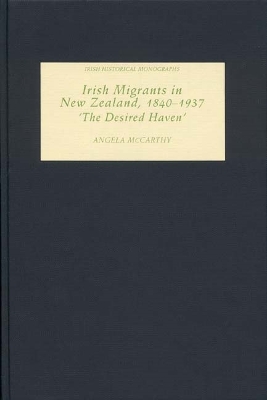Irish Historical Monographs
1 total work
An innovative and original contribution to the history of European migration between the mid-nineteenth century and the interwar years.
I have at last reached the desired haven', exclaimed Belfast-born Bessie Macready in 1878, the year of her arrival at Lyttelton, when writing home to cousins in County Down....Read more
I have at last reached the desired haven', exclaimed Belfast-born Bessie Macready in 1878, the year of her arrival at Lyttelton, when writing home to cousins in County Down....Read more
An innovative and original contribution to the history of European migration between the mid-nineteenth century and the interwar years.
I have at last reached the desired haven', exclaimed Belfast-born Bessie Macready in 1878, the year of her arrival at Lyttelton, when writing home to cousins in County Down. There was a huge amount of worldwide European migrationbetween the mid-nineteenth and mid-twentieth centuries, a phenomenon which this book examines. Making close use of personal correspondence exchanged between Ireland and New Zealand, the author addresses a number of central questions in migration history, including the circumstances of departure; why some connections chose to stay; how migrant letter writers depicted their voyage out, the environment, work, family and neighbours, politics, and faith; and the prevalence of return and repeat migration. Throughout, the book gives significant attention to the social networks constraining and enabling migrants. It also considers broader debates in the history of European migration, relating to the use of personal testimony to chart the experiences of emigrants and the uncertain processes of adaptation, incorporation, and adjustment that migrants underwent in new and sometimes unfamiliar environments.
I have at last reached the desired haven', exclaimed Belfast-born Bessie Macready in 1878, the year of her arrival at Lyttelton, when writing home to cousins in County Down. There was a huge amount of worldwide European migrationbetween the mid-nineteenth and mid-twentieth centuries, a phenomenon which this book examines. Making close use of personal correspondence exchanged between Ireland and New Zealand, the author addresses a number of central questions in migration history, including the circumstances of departure; why some connections chose to stay; how migrant letter writers depicted their voyage out, the environment, work, family and neighbours, politics, and faith; and the prevalence of return and repeat migration. Throughout, the book gives significant attention to the social networks constraining and enabling migrants. It also considers broader debates in the history of European migration, relating to the use of personal testimony to chart the experiences of emigrants and the uncertain processes of adaptation, incorporation, and adjustment that migrants underwent in new and sometimes unfamiliar environments.
